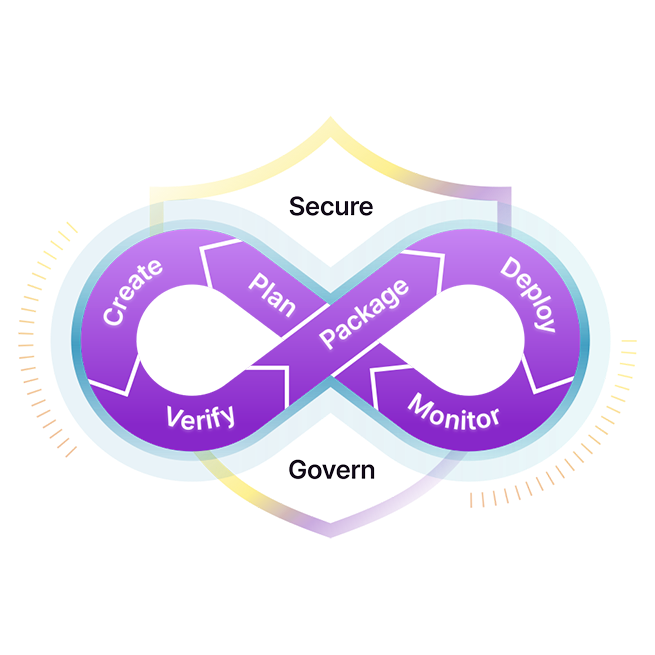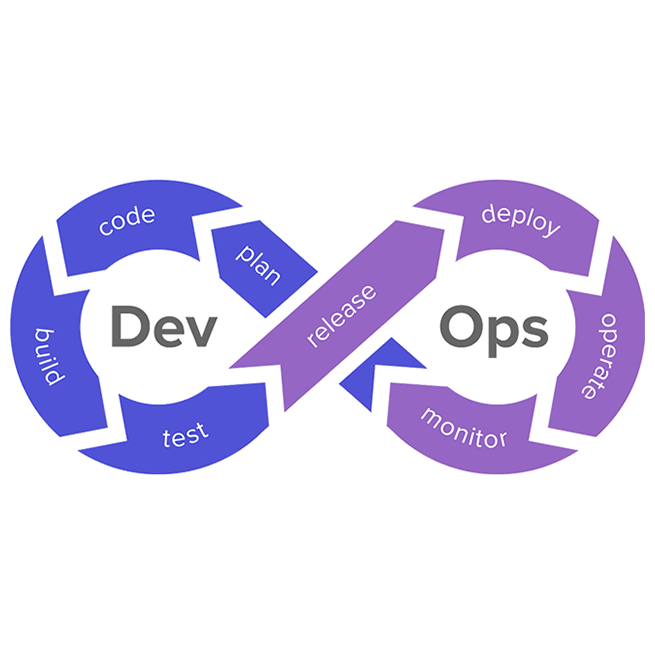
Devops
- Home
- Devops

DevOps/DevSecOps Services
DevOps/DevSecOps Services
DevOps Model Defined At its core, DevOps is a mindset that emphasizes collaboration, communication, and automation between development and operations teams. It involves breaking down silos, adopting agile methodologies, and utilizing cutting-edge technologies such as containerization, microservices, and infrastructure as code to accelerate the delivery of high-quality software and services while minimizing risks and costs. Ultimately, DevOps enables organizations to be more responsive to customer needs, more competitive in the market, and more efficient in their operations.
The Best DevOps/DevSecOps Services for Our Customers.
Stop worrying, we take care of your DevOps/DevSecOps problems.

How DevOps Works
Alternatively, in organizations with separate development and operations teams, collaboration and communication are greatly enhanced through the adoption of DevOps practices. This includes the use of automation tools for tasks such as testing, deployment, and configuration management, as well as a focus on continuous integration, continuous delivery, and continuous monitoring. By breaking down traditional barriers between development and operations, DevOps enables faster and more reliable software delivery, while also improving overall system reliability and reducing costs associated with downtime and manual processes.
In DevSecOps, the traditional boundaries between quality assurance and security teams blur as they become more closely aligned with development and operations. This integration ensures that security considerations are not an afterthought but are instead embedded into every stage of the application lifecycle. By automating manual and slow processes, DevSecOps teams leverage a technology stack and tooling that enables them to operate and evolve applications quickly and reliably. This approach empowers engineers to independently accomplish tasks, such as deploying code or provisioning infrastructure, without relying on other teams, ultimately increasing the team’s overall velocity.
Benefits of DevOps

Speed
DevOps practices also promote collaboration and communication between development and operations teams, reducing the time and effort required for resolving issues and delivering new features. By automating tasks such as testing, deployment, and monitoring, DevOps enables organizations to respond quickly to customer needs and market demands, giving them a competitive edge in today’s fast-paced business environment. Ultimately, the speed and agility gained through DevOps enable organizations to deliver better products and services to their customers while driving down costs and improving overall efficiency.

Rapid Delivery
By implementing continuous integration and continuous delivery, organizations can significantly reduce the time it takes to bring new features and updates to market. This rapid delivery approach allows for more frequent and smaller releases, enabling teams to quickly respond to customer feedback and address any issues that arise. By automating the build, test, and deployment processes, organizations can also reduce the risk of errors and ensure a consistent and reliable product for their users. Ultimately, rapid delivery leads to a more agile and innovative product development cycle, giving companies a competitive edge in today’s fast-paced digital landscape.

Reliability
By implementing reliable practices such as continuous integration and continuous delivery, organizations can ensure the quality of their application updates and infrastructure changes. These practices involve automating the testing and deployment process, allowing for faster and more frequent updates without compromising on functionality or safety. Additionally, monitoring and logging practices enable real-time performance tracking, allowing for quick identification and resolution of any issues that may arise. By prioritizing reliability, organizations can deliver updates at a more rapid pace while maintaining a positive user experience.

Scale
Additionally, containerization technologies like Docker enable you to package and deploy applications in a standardized and portable way, making it easier to scale and manage multiple instances of your application. By implementing these practices, you can better handle the demands of a growing user base and ensure the reliability and consistency of your service

Improved Collaboration
Additionally, DevOps practices such as continuous integration and continuous delivery facilitate faster and more frequent releases, allowing teams to respond quickly to customer needs and market demands. By promoting open communication, regular feedback, and a focus on shared goals, DevOps helps to foster a culture of trust and collaboration that ultimately leads to better outcomes for the organization.

Security
This approach allows for continuous monitoring and remediation of security issues, as well as the ability to quickly respond to new threats and vulnerabilities. By automating compliance policies and implementing fine-grained controls, organizations can also reduce the risk of human error and misconfigurations, which are common causes of security breaches. Overall, adopting a DevOps model with a focus on security can lead to more agile and secure software delivery while maintaining compliance with regulatory requirements.
How to Adopt a DevOps Model
DevOps Cultural Philosophy
In essence, the cultural philosophy of DevOps is centered around collaboration, communication, and shared responsibility. It encourages teams to break down traditional silos and work together towards a common goal of delivering high-quality services to customers. DevOps emphasizes the importance of frequent and open communication, automation, and continuous improvement to optimize productivity, reliability, and quality. By adopting a DevOps mindset, organizations can foster a culture of ownership, accountability, and customer-centricity that drives innovation and success in today’s rapidly evolving digital landscape.
DevOps Practices Explained
Additionally, automation and orchestration tools are essential in accelerating innovation through software development and infrastructure management. These tools enable organizations to automate repetitive tasks, such as building, testing, and deploying applications, freeing up developers’ time to focus on more strategic work. They also provide visibility and control over the entire software delivery pipeline, making it easier to identify and address issues quickly.
Furthermore, microservices enable organizations to adopt a more iterative and experimental approach to development, as each service can be developed, tested, and deployed independently. This allows teams to rapidly prototype and iterate on new ideas, as well as respond more quickly to changing business requirements or market demands. Overall, the microservices architecture promotes greater agility, scalability, and resilience in modern software applications.
The adoption of microservices and increased release frequency in modern software development presents operational challenges due to the significant increase in deployments. DevOps practices such as continuous integration and continuous delivery address these issues by enabling organizations to deliver rapidly in a safe and reliable manner. Infrastructure automation practices like infrastructure as code and configuration management keep computing resources elastic and responsive to frequent changes. Monitoring and logging help engineers track application and infrastructure performance, allowing for quick problem resolution. By implementing these practices, organizations can deliver faster, more reliable updates to their customers.
What We’re Offering
Why you Should Choose Our Services
We offers a DevOps/DevSecOps services that meet varied business requirements to help improve business performance of enterprises.
- Take a professional approach
- Provide unhindered support 24/7
- Offer full-cycle IT services
- We take our job seriously
- Our team is qualified

Client Testimonials
What They’re Talking?

Lisa Hardson
Senior Designer
I wanted to take a moment to express my sincere appreciation for the outstanding service and exceptional DevOps solutions provided by your team. Our experience working with DataOpsGrid has been nothing short of impressive.

Aleesha Smith
VP Sales
I am writing to share my gratitude for the remarkable experience I had working with your team on our recent DevOps initiative. DataOpsGrid has undoubtedly proven to be a professional IT company that consistently delivers quality software solutions.

Peek Thakul
DevOps Manager
I am writing to share my gratitude for the remarkable experience I had working with your team on our recent DevOps initiative. DataOpsGrid has undoubtedly proven to be a professional IT company that consistently delivers quality software solutions.
Active Clients
Projects Completed
Glorious Years
Professional team
Newsletter
© All Copyright 2024
